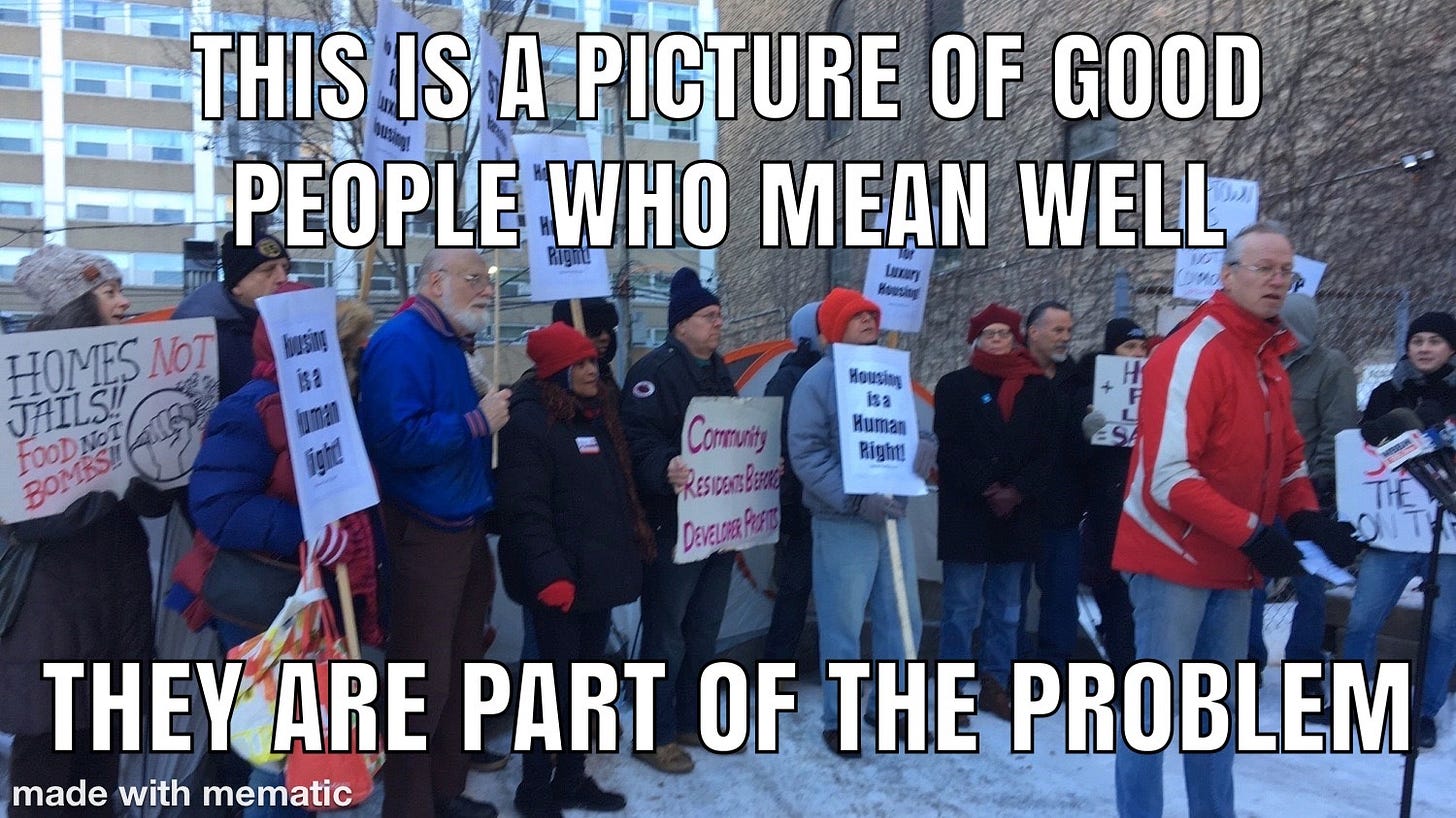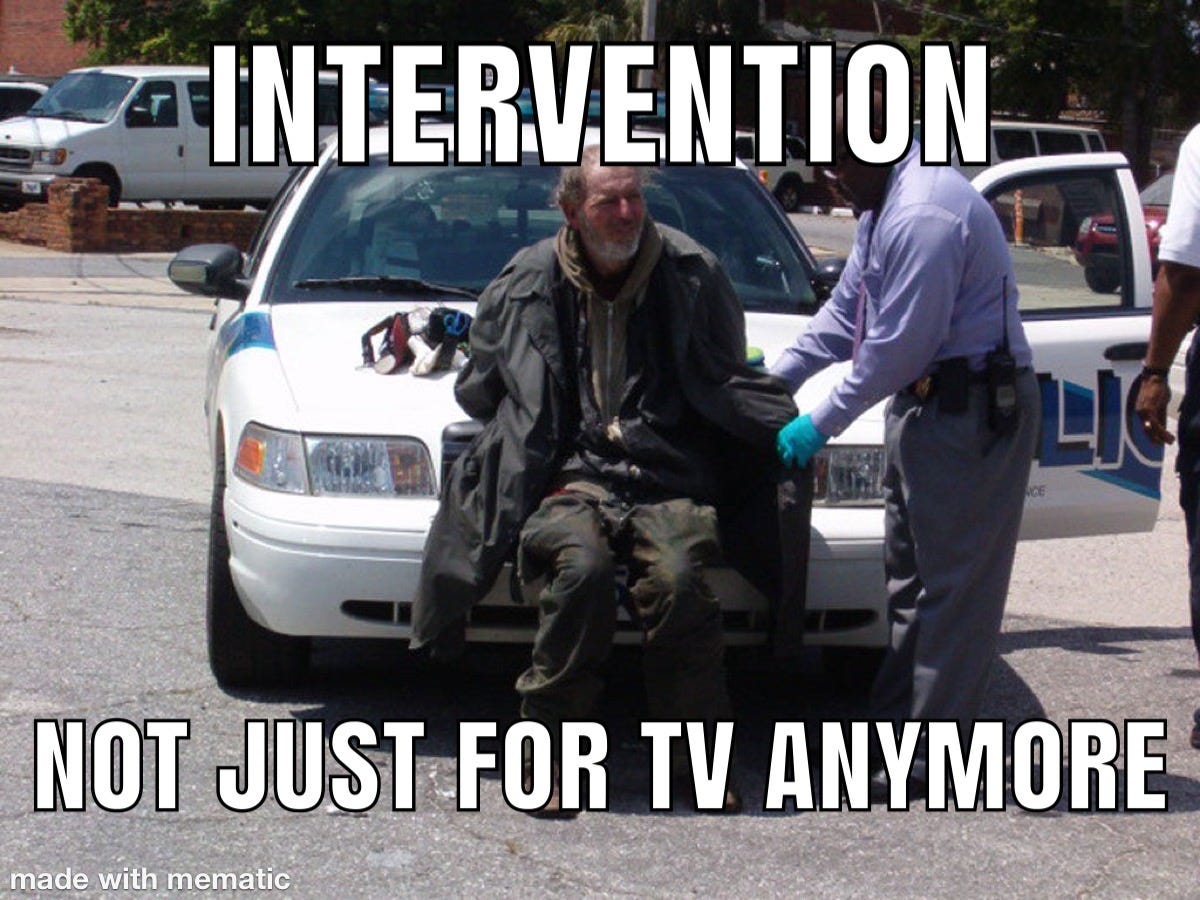Step 1: Admit the Problem
For all of the high minded rhetoric and hot air on the subject of homelessness, there is a population of people in our country that virtually nobody cares about. Politicians and left wing activists will claim they care, but they don’t. The religious people who are in the streets preaching to them to get sober and offering them “services” think they care, but they are wrong. The soup kitchens and shelters don’t care… half of them are just looking for more budget. Conservatives don’t care. Liberals don’t care. You don’t care and I don’t care.
Harsh, right? But it’s a fact. Caring for someone isn’t a feeling… it’s a verb. Its something you either do or don’t do. How you feel is irrelevant.
The fact is that we are all taking part in a system of complete apathy toward insane, dangerous, and drug addicted people. They are making beautiful cities unlivable. They are hurting each other and on some occasions attacking normal citizens. They are perpetrators and victims of rape, vicious assaults, and murder. They are diseased. They are unhygienic. They are mentally ill. They are addicted to hard drugs. They are dying and nobody is doing anything about it.
These are Americans. Even the ones who aren’t citizens are living here in America. Either help them or deport them. We are the wealthiest country the world has ever seen. Our government is gigantic and has inconceivable amounts of money. Something can be done… but because it’s either politically unpalatable, or people are afraid of a backlash from activists, or because people are just apathetic… nothing is being done.
That’s the problem.
Step 2: Define the Goal
What the goal is not: Fixing a group of people who don’t want to be fixed, leaving no one behind and sacrificing the good of law abiding society to enable people who refuse to help themselves.
What the goal is: To humanely reclaim our cities and offer an honest path forward for those willing to accept it while ethically moving those who refuse, out of encampments and into a system that makes sense for all involved.
Step 3: Be Honest About Why This is Happening
As a whole, homeless activists are a problem. They refuse to consider any kind of coercion in dealing with the sea of people currently living and dying in America’s streets. They ignore the fact that shelters sit with availability as long as the weather allows people to stay outside. They insist that simply giving someone an apartment or hotel room and offering services, while requiring no conditions be met, is somehow humane. They refuse to acknowledge the reality that the reason most of the homeless live the way they do is because it allows them easy access to the drugs to which virtually all of them are hopelessly addicted.
The homeless population in the United States is not here because of poverty. It is not here because there isn’t anywhere to live. It’s here because we have a certain percentage of our population that is broken. Long ago, they gave up on functional existence. They gave up on being part of society.
The situation isn’t that there is a mass of people trying to get their act together and rejoin the living. The situation is that there is a mass of people who have no interest in, or need, to live in society like the rest of us. Once you start to look at the problem through that lens, the solution becomes a little clearer.
If we agree that what is happening is unacceptable and we agree that we have a moral imperative to intervene in the pandemic of homelessness we are seeing in every city around the country (some much more than others)… and we also agree that most of the people don’t want help… then logically, we must agree that most of them will have to be coerced in one way or another.
That is what caring will look like.
Step 4: Stop Lying About Who These People Are
That is a pretty unnerving picture. That man is high on meth and probably a bunch of other stuff. He is insane and/or psychotic. He is most certainly diseased. He needs help right now. And he’s not going to get it, because every time you hear politicians or activists talk about the homeless, they spin some fairytale about a woman who ran away from an abusive relationship and ended up on the street. Or they tell some fantasy about a hard working man who lost his job and couldn’t pay his bills.
Let’s talk about the reality for a minute. Virtually none of those people end up in homeless encampments. They accept the aid that is offered. They get help from family and friends. They take church charity and accept Section 8 housing. They make changes and start to fight their way back. They don’t start smoking meth and living in a damn tent on Sunset Boulevard… and if you don’t know that, you should.
The people living in the streets are not a group of normal people, just like you and me, who were one paycheck away from disaster when disaster came. They are far further gone than that. Most are people with major mental health issues like bipolar disorder, schizophrenia, and other unmanaged delusions mixed with substance abuse at a scale that would make Chris Farley take a step back.
Many do have families somewhere. But families are not always equipped to deal with major mental health issues mixed with major substance abuse problems. These are very difficult people. They don’t live in reality. They don’t take their medications. They steal from family members. Some attack or sexually assault family members. So eventually, their families cut them off. It’s cruel, but for many families… especially ones that don’t have money for inpatient care for a loved one, it’s their only option. I mean… family or not, I’m not letting the dude in the photo above live with me… are you?
Step 5: Never Forget That These Are Human Beings
I insert this point to remind myself of this fact as much as to remind you. These are human beings. They are our countrymen. They need help.
Step 6: Help Looks Like Coercion, Because It Is
If we agree that what is happening with the homeless encampments is unacceptable… and I hope we do agree on that… then logically we must agree that people must be forced to change. Society must intervene.
That seems weird to even type. I am a pretty hard core libertarian when it comes to how people live. I don’t really care what people do in their own homes or on their own time. If you like drugs, have fun… it’s none of my business.
But there are limits to what a society can accept when it comes to behavior in the public square. Our streets are not for people to live on. Our parks are not for people to do drugs in and have sex in. Our public spaces are for taxpayers to use and enjoy, not to house junkies.
Therefore, one important step in improving this seemingly insurmountable problem is to train and equip police with the skills and tools needed to humanely and lovingly… roust the bums.
Last time I checked, heroin and meth were still illegal in this country. Shoplifting and mugging people is still illegal. You aren’t allowed to just shoot up drugs on the street, go crazy, have sex with another junkie in plain view of everyone, and then scream epithets into the ether. It’s against the law. Those laws need to be enforced.
Police must be empowered to do their jobs.
Step 7: The Key Is What Happens Next
This is a photo of Judge Patricia Keller. She was featured in the documentary Heroin(e) on Netflix. She puts drug offenders in jail. If you find yourself in her court, she will lovingly demand that you get off drugs and off the street and stay that way. If you don’t, she will lock your ass up without blinking an eye.
But that’s the difference between a Huntington, West Virginia judge and a bunch of advocates out in California. Judge Keller is offering the same kinds of treatment that addicts in San Francisco are offered… But she’ll take your freedom away if you don’t accept it. If a person breaks the law, they are at the mercy of the court. And when possible, the courts should be merciful… but not at the expense of society.
If we are to agree that the people in homeless encampments are breaking laws (and that’s impossible to deny)… and we are to agree that they should be arrested and taken off the street… then it stands to reason that they should be coerced into not returning.
I want to be clear here. Drug addiction and mental health problems are not easily solved. Many people backslide and fail. But they cannot be allowed to fail back into disgusting encampments littering our streets. They should be involuntarily committed if it comes to that. They should be humanely treated and properly medicated. They should be cared for and cared about.
We have the money to do this. The laws are already in place. All we need is the political will.
Step 8: Poke Them With A Stick, Gently
Remember these guys? Neighborhood cops walking a beat? We need a bunch more of them. Once we have broken down the encampments and made arrests and coerced people into treatment and cleaned up the needles and glass and filth, you ask these guys to keep it that way.
When they see a bum sleeping on a park bench, they need to walk up to him, gently poke him in the ribs with a billy club, and tell him to move along. If they see him doing drugs, they need to arrest him. If they get a report of a car break in or a mugging, they need to arrest the perpetrator. The police need to enforce the law and provide for clean streets, safe neighborhoods, and nice cities. That’s their job.
All these things I’ve talked about here are relatively simple. The naysayers will say that the problem is just too large. They are wrong. It isn’t. We waste so many resources in this country. Our government is so bloated and expensive. We send billions of dollars overseas to god knows who for god knows what.
Hell, the Congress just passed a $1.5 trillion bill and nobody even knows what’s in it or cares. It wouldn’t be hard to reappropriate just a fraction of that to permanently fixing this problem.
More treatment facilities. More police officers. More drug courts. More places for people to go when they decide to try for better, and more places to put them when they decide they won’t. This is not only possible, I believe that it is a moral imperative. One day, future generations will look at our apathy toward the people on the street as shameful. I look at it that way now.
Non Sequitur:
There were only three Indiana Jones movies. The rest are media versions of store brand cereal that sat too long in the cupboard. You can tell yourself that there’s no difference… but there is a difference, and it’s obvious.
Happy Monday all!
—V












